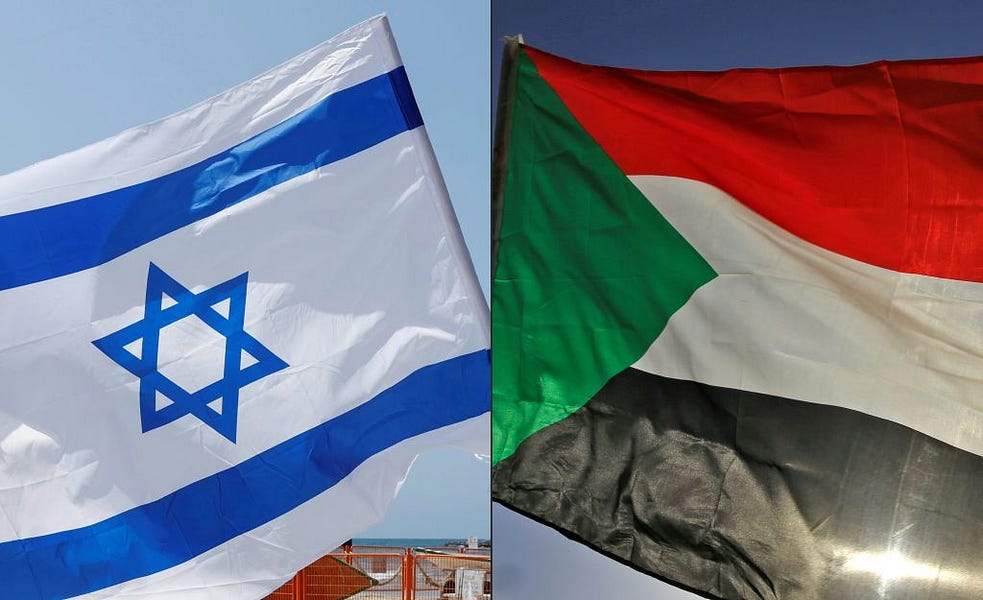It hasn’t garnered as much attention as other “Abraham Accord” peace deals between Israel and moderate Islamic states, but Israel’s recent normalization of relations with Sudan is just as important, if not more important, than those earlier agreements. The two countries announced they’d reached a deal in October, but earlier this month, then-Treasury Secretary Steven Mnuchin traveled to Sudan as the countries formally signed a normalization agreement and announced that Sudan would be receiving more than $1 billion annually from the World Bank for the first time in nearly three decades. The U.S. had in November removed Sudan from its list of nations that sponsor terrorism.
Sudan’s relationship with Israel has been fraught with far more conflict than the latter’s ties with Bahrain, the United Arab Emirates, or Morocco. Sudanese forces have fought in the various Arab-Israeli wars down through the decades.
During the first Arab-Israeli War in 1948, Sudan was not yet an independent country, but hundreds of Sudanese soldiers fought in the conflict and 43 were killed in action. Sudanese soldiers participated in subsequent Arab-Israeli wars as well. In 1967, in the aftermath of the Six-Day War, the Arab League met in Sudan to pass the infamous Khartoum Resolution, which called for “no peace with Israel, no recognition of Israel, no negotiations with it.”
Israel’s earlier deals were seen as a breakthrough, and deservedly so. At the same time, those Gulf Arab states and Morocco have had discreet but friendly ties with Israel for years. Sudan’s history was far different. Yet there were times when a breakthrough seemed tantalizingly close only to be dashed by Sudanese political developments.
In 1989, Col. Omar Bashir led a bloodless coup that brought to power the Islamist leader Hassan Al Turabi, which piqued Iran’s interest. Iran’s leaders saw in Sudan a Sunni version of the 1979 Islamic Revolution in Iran. Al Turabi courted terrorists of all stripes. For a brief moment in the 1990s, the world’s two most famous terrorists—Carlos the Jackal and Osama Bin Laden—both lived in Khartoum. The Clinton administration responded with sanctions, but with a cynical exception made for gum arabic, a food additive of which Sudan was the world’s major producer—a bit like sanctioning Brazil but leaving an exception for coffee. In light of the sanction and changes in domestic politics, Sudan’s leaders grew tired of hosting such terrorists. As such the French government made a deal with the Sudanese government and assisted in the capture of Carlos the Jackal in 1994. According to the U.S. ambassador to Khartoum at the time, a similar deal that would have handed Osama Bin Laden to the United States was nixed by the Clinton administration. American hostility toward Khartoum from the Clinton administration certainly would have undercut any Israeli-Sudanese rapprochement efforts at the time. Roughly four years later, President Bill Clinton ordered a missile attack on a site in Khartoum that was claimed to be producing chemical weapons, though the intelligence behind that claim has been disputed.
While Sudan broke ties with other terrorist groups, its relationship with Iran proved more durable. Iran used Sudan as a base from which to support groups like Hamas and sell weapons across Africa. Indeed, the Sudanese government accused Israel of perpetrating multiple airstrikes in Sudan in 2009 and in 2012. While Israel publicly denied the claim, analysts believe these airstrikes were meant to undercut Iranian-backed operations in the country. In 2014, Col. Bashir did break firmly with Iran, and Israeli officials began encouraging the United States to develop ties with Khartoum.
Without the 1989 coup and the Muslim Brotherhood-inspired worldview of Hassan al Turabi, peace between Israel and Sudan may have come much sooner. During the 1950s, Sudan’s Ummah Party held meetings with Israeli representatives. Both the Ummah Party and Israel were concerned at that time by the rise of Arab socialism as championed by Egyptian President Abdel Gamal Nasser. Indeed, reducing Egypt’s influence in Sudan was one of the driving goals of President Eisenhower’s policy toward the country when it was granted independence in 1956. At the time of Sudan’s independence the country had a small but thriving Jewish community.
“There were 250 Jewish families in Sudan at the time, and they were well respected. They had a social club and [synagogue],” says Mubarak Fadil Al Mahdi. “They only left due to the communist policies of confiscation of private sector property after the 1969 coup.” Many Jewish families had long since fled Sudan for Israel or other places as anti-Semitism rose in the country in the 1960s. After Egyptian President Anwar Sadat made peace with Israel in defiance of the Khartoum Resolution at the Camp David Accords in 1978; the Arab world shunned Egypt. Yet Sudan soon continued ties with Egypt as usual.
As late as October 1982, Sudan signed an agreement with Egyptian President Hosni Mubarak aimed at closer integration. During the 1980s, the focus of Sudan’s foreign policy shifted closer to home. Ethiopia, which borders Sudan, was home to one of the world’s most brutal communist regimes. More than 1 million people died from war, starvation, or torture in the dungeons of Mengistu Haile Mariam. Thousands of Ethiopians fled to neighboring Sudan as refugees, including many of Ethiopia’s Falasha Jews. A covert Israel operation to rescue these Ethiopian Jews was the subject of the 2019 Netflix film Red Sea Diving Resort, which offers a fictionalized account of that network.
The United States encouraged Sudan’s involvement in rescuing Ethiopia’s Jews. In 1984, Vice President George Bush met Sudanese President Jaafar Nimeiri to ensure Sudanese acquiesce to Israel’s “Operation Moses.” The revelation of the operation in Western media outlets forced an end to these efforts in 1985. Nimeri was overthrown a few months later, leading to a turbulent period in Sudanese politics and the eventual 1989 coup by Col. Baashir that led to decades of isolation as a rogue state.
The creation of peaceful ties between Israel and Sudan is already bearing fruit with Israel sending $5 million in wheat to Sudan in October. Indeed, Sudan, home to some of the world’s most fertile land, could learn much from Israeli agricultural science, which has dramatically increased the productivity of Israel agricultural sector.
A meeting this past week hosted online between Israel’s minister of energy and his counterparts in Morocco, Egypt, UAE, Bahrain and yes, Sudan suggests that such partnerships are just the tip of the iceberg.
“The ministers discussed how diplomatic relations between the countries could revolutionize national security, economic prosperity and adding content to the peace agreements, including investments in energy research and development, deploying infrastructure and technology,” the Israeli government said in a statement.





Please note that we at The Dispatch hold ourselves, our work, and our commenters to a higher standard than other places on the internet. We welcome comments that foster genuine debate or discussion—including comments critical of us or our work—but responses that include ad hominem attacks on fellow Dispatch members or are intended to stoke fear and anger may be moderated.
With your membership, you only have the ability to comment on The Morning Dispatch articles. Consider upgrading to join the conversation everywhere.